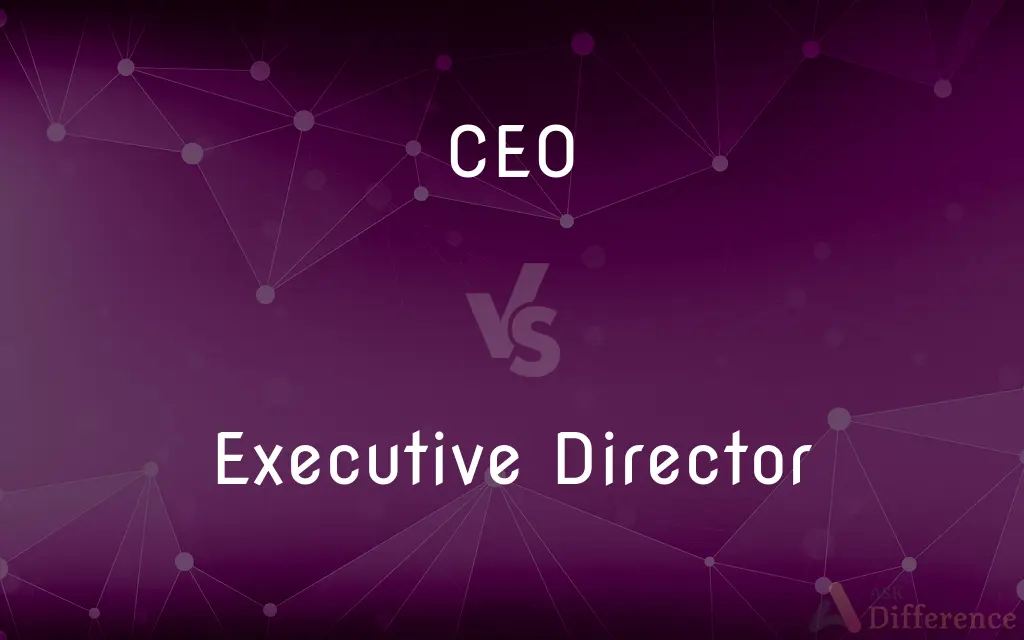CEO vs. Executive Director — What's the Difference?
By Tayyaba Rehman — Published on October 23, 2023
CEO is the Chief Executive Officer, responsible for overall strategic and operational decisions. Executive Director leads the implementation of board policies, often in non-profit sectors, and may have a less strategic, more operational focus.

Difference Between CEO and Executive Director
Table of Contents
ADVERTISEMENT
Key Differences
In many organizations, the CEO is focused on providing direction, establishing company-wide strategies, and interacting with external stakeholders, including investors and media. The Executive Director, especially in non-profits, typically navigates within the operational framework defined by the board, ensuring policies are enacted and operational goals are achieved.
Tayyaba Rehman
Oct 23, 2023
Despite the more strategy-oriented role of CEOs, and the implementation-driven role of Executive Directors, there are instances, particularly in smaller companies or NGOs, where the roles may blend, with CEOs being more operationally active and Executive Directors being involved in strategic decision-making.
Tayyaba Rehman
Oct 23, 2023
The CEO, or Chief Executive Officer, stands as the highest-ranking individual in a company, making critical decisions regarding strategy, management, and overall operations. Conversely, the Executive Director, often associated with non-profit organizations, tends to focus more on implementing policies set by the board and managing daily operations, although their role can still involve significant decision-making.
Tayyaba Rehman
Oct 23, 2023
It’s crucial to note that the CEO is often seen as the public face of a company, representing it in various external forums and media interactions. The Executive Director, on the other hand, may be more internally focused, ensuring that board-directed strategies and policies are properly executed within the organization.
Tayyaba Rehman
Oct 23, 2023
A distinctive delineation between a CEO and an Executive Director can often be seen in for-profit and non-profit entities respectively, where the former usually operates in a for-profit context while the latter is commonplace in non-profits and NGOs, ensuring alignment between board policies and organizational activities.
Tayyaba Rehman
Oct 23, 2023
ADVERTISEMENT
Comparison Chart
Primary Focus
Often oriented towards strategic management and external relations.
Primarily focused on implementing board policies and managing operations.
Tayyaba Rehman
Oct 23, 2023
Typical Sector
Commonly found in for-profit sectors.
Often associated with non-profit sectors.
Tayyaba Rehman
Oct 23, 2023
Decision-making
Involves high-stake, company-wide strategic decisions.
Decisions are often more operational, aligned with board policies.
Tayyaba Rehman
Oct 23, 2023
External Interaction
Frequently interacts with external stakeholders and media.
May have limited external interactions, focusing more on internal management.
Tayyaba Rehman
Oct 23, 2023
Policy Implementation
May or may not be directly involved in policy implementation.
Directly responsible for ensuring the implementation of board policies.
Tayyaba Rehman
Oct 23, 2023
ADVERTISEMENT
Definitions
CEO
CEOs shape and establish a company’s strategies and policies.
The CEO introduced a new strategy to penetrate emerging markets.
Tayyaba Rehman
Oct 03, 2023
Executive Director
Often, the Executive Director is responsible for ensuring compliance and ethical adherence in organizational processes.
The Executive Director conducted a comprehensive review to ensure regulatory compliance across all programs.
Tayyaba Rehman
Oct 03, 2023
CEO
CEO is the top executive responsible for a company's overall operations and performance.
The CEO decided to diversify the company’s product line to enhance profitability.
Tayyaba Rehman
Oct 03, 2023
Executive Director
In non-profits, the Executive Director is often the link between the board and the organization’s operations.
The Executive Director presented a detailed operational report to the board monthly.
Tayyaba Rehman
Oct 03, 2023
CEO
A CEO is responsible for ensuring shareholder value and maintaining investor relations.
Under the new CEO, the company witnessed a remarkable increase in shareholder value.
Tayyaba Rehman
Oct 03, 2023
Executive Director
Executive Directors ensure the alignment between organizational operations and board strategies.
The Executive Director revised operational procedures to align with the board's new sustainability strategy.
Tayyaba Rehman
Oct 03, 2023
CEO
CEOs guide organizational culture and establish management practices.
The CEO fostered a culture of innovation within the organization.
Tayyaba Rehman
Oct 03, 2023
Executive Director
Executive Directors manage internal aspects, like team management, program implementation, and operational controls.
The Executive Director introduced a new project management tool to enhance operational efficiency.
Tayyaba Rehman
Oct 03, 2023
CEO
The CEO represents the company to stakeholders, media, and public forums.
The CEO defended the company’s reputation during a press conference.
Tayyaba Rehman
Oct 03, 2023
Executive Director
An Executive Director oversees day-to-day activities and implements board policies within an organization.
The Executive Director coordinated various departments to implement the new policy seamlessly.
Tayyaba Rehman
Oct 03, 2023
CEO
The corporate executive responsible for the operations of the firm; reports to a board of directors; may appoint other managers (including a president)
Tayyaba Rehman
Sep 30, 2023
FAQs
To whom does an Executive Director report?
In non-profit settings, Executive Directors generally report to the Board of Directors.
Tayyaba Rehman
Oct 23, 2023
How involved is an Executive Director in daily operations?
Executive Directors are often deeply involved in daily operations, especially within non-profit organizations, ensuring alignment with organizational strategy and goals.
Tayyaba Rehman
Oct 23, 2023
What is a CEO?
The CEO, or Chief Executive Officer, is the highest-ranking executive in a company, primarily responsible for making major corporate decisions and managing overall operations.
Tayyaba Rehman
Oct 23, 2023
How do the responsibilities of a CEO and an Executive Director differ?
While both are leadership roles, CEOs often focus more on corporate strategy, shareholder value, and high-level decision-making, whereas Executive Directors may be more hands-on in daily operations and, in non-profits, fundraising efforts.
Tayyaba Rehman
Oct 23, 2023
To whom does a CEO report?
The CEO typically reports to the Board of Directors.
Tayyaba Rehman
Oct 23, 2023
Can a CEO be the founder of a company?
Yes, CEOs can be founders, but not all CEOs are founders and vice versa.
Tayyaba Rehman
Oct 23, 2023
What are the typical responsibilities of a CEO?
CEOs oversee the company’s strategy, manage leadership teams, drive organizational culture, and make pivotal decisions regarding company direction and policies.
Tayyaba Rehman
Oct 23, 2023
How is a CEO’s performance typically evaluated?
A CEO’s performance is often assessed based on company performance, leadership, strategy implementation, and other KPIs, typically by the Board of Directors.
Tayyaba Rehman
Oct 23, 2023
Who tends to have a higher salary, CEOs or Executive Directors?
Salaries can vary widely; however, CEO positions, especially in large corporations, tend to command higher salaries than Executive Director roles.
Tayyaba Rehman
Oct 23, 2023
Can a CEO also be an Executive Director?
While both roles are leadership positions, whether one can hold both titles may depend on the specific organizational structure and regulations.
Tayyaba Rehman
Oct 23, 2023
What is an Executive Director?
An Executive Director is a senior leadership role, often in non-profit organizations, responsible for overseeing day-to-day operations, and executing organizational strategy and policies.
Tayyaba Rehman
Oct 23, 2023
What does an Executive Director do?
Executive Directors manage daily operations, lead strategy implementation, engage in fundraising, manage staff, and often serve as the public face of the organization.
Tayyaba Rehman
Oct 23, 2023
Can an Executive Director be a voting member of the Board of Directors?
This depends on organizational bylaws. In some cases, they can be, but often they may participate in board meetings without voting rights.
Tayyaba Rehman
Oct 23, 2023
Is the role of CEO more prevalent in certain types of organizations than that of Executive Director?
Generally, CEO is a common title in corporations, while Executive Director is often used in non-profits, NGOs, and sometimes in governmental agencies.
Tayyaba Rehman
Oct 23, 2023
Can the roles of CEO and Executive Director be blended into one position in smaller organizations?
In some smaller entities, one person might indeed fulfill both roles, overseeing both high-level strategy and daily operations, though the title used may vary.
Tayyaba Rehman
Oct 23, 2023
Author Spotlight

Written by
Tayyaba RehmanTayyaba Rehman is a distinguished writer, currently serving as a primary contributor to askdifference.com. As a researcher in semantics and etymology, Tayyaba's passion for the complexity of languages and their distinctions has found a perfect home on the platform. Tayyaba delves into the intricacies of language, distinguishing between commonly confused words and phrases, thereby providing clarity for readers worldwide.

















































